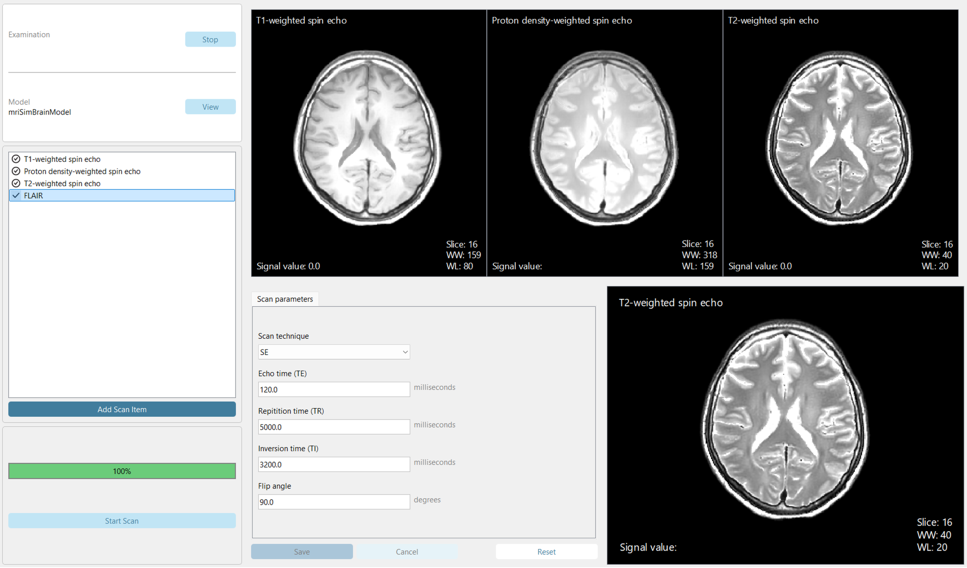Educational Magnetic Resonance Imaging Simulator (eduMRIsim)
Summary of the Project
The eduMRIsim project, led by Eindhoven University of Technology (TU/e), focuses on developing a comprehensive MRI simulator to improve MRI education at the university level. Traditional MRI training at TU/e is limited to lectures, as hands-on access to MRI scanners is financially and logistically impractical. To address this, eduMRIsim will provide a realistic, open-source MRI simulation platform that allows students to experiment with MRI settings, conduct virtual scans, and understand how changes in parameters impact image quality. The simulator will mimic clinical interfaces and workflows, ensuring students gain experience that closely mirrors real-world MRI operations.
eduMRIsim will support both bachelor’s and master’s courses, specifically in Biomedical and Electrical Engineering. Through challenge-based learning, students will move from passive to active learning by tackling simulated scanning challenges, such as optimizing imaging for moving subjects or vascular structures. This aligns with TU/e’s 2030 vision for education, emphasizing practical applications of theoretical concepts. The simulator’s modular and open-source design will allow for future updates and broad accessibility, fostering collaboration with other institutions and expanding its impact on MRI education beyond TU/e.
Aim of the Project
The aim of the eduMRIsim project is to revolutionize MRI education by providing a hands-on, simulation-based learning tool that enables students to apply MRI principles in a controlled, virtual environment. This initiative seeks to fill the gap in traditional MRI education, which is largely theoretical due to the prohibitive costs and complexities of real MRI machines. By creating a clinically realistic, user-friendly simulator, eduMRIsim will allow students to engage in the entire MRI workflow, from scan planning to image analysis.
eduMRIsim specifically targets challenge-based learning, enabling students to actively test and refine their understanding by adjusting scanning parameters and handling simulated issues. This educational approach encourages problem-solving skills and strengthens comprehension of MRI physics and technology. The simulator will serve diverse educational levels, from foundational learning in bachelor’s courses to advanced applications in master’s programs. Through eduMRIsim, TU/e aims to enhance MRI education quality, increase student engagement, and set a new standard for practical, simulation-based training in medical imaging.

Results and Learnings
A first version of eduMRIsim has been developed which allows students to perform a simplified clinical MRI scanning workflow and experiment with various MRI settings that influence image contrast. Students can compare side-by-side images to observe how adjustments affect image quality.
To assess the first version of eduMRIsim, 20 researchers involved in MRI education as (assistant) teachers or project supervisors completed example tutorial exercises with the simulator and answered a questionnaire. For user-friendliness, 95% of participants rated eduMRIsim a 4 or 5 on the 5-point Likert scale with 1 being “not at all” and 5 being “very” (average: 4.3). Clinical similarity received an average score of 3.6. The simulator’s value for teaching the effect of scan parameters on image appearance was also rated highly, with an average of 4.5.
A second version of eduMRIsim is currently under development and will include a more clinically realistic workflow, which a group of TU/e Computer Science Bachelor students significantly contributed to during their graduation project. This version will also feature additional adjustable parameters and simulate patient motion along with other imaging artifacts to improve the realism of the generated MR images.
eduMRIsim will be used in TU/e’s “Advanced Imaging Techniques” Bachelor course, which covers MRI Physics, in challenge-based tutorials. These exercises will help students to deepen their understanding of MRI theory through practical application.


